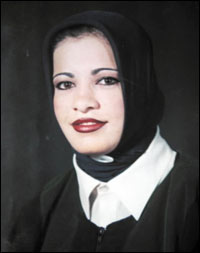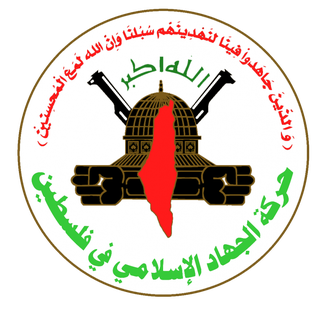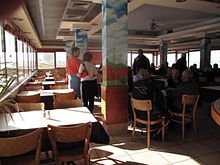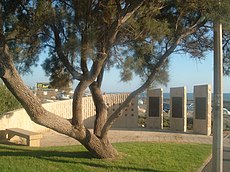Note: This compilation includes only those attacks that resulted in casualties. Attacks which did not kill or wound are not included.

The Second Intifada, also known as the Al-Aqsa Intifada, was a major uprising by Palestinians against the Israeli occupation, characterized by a period of heightened violence in the Palestinian territories and Israel between 2000 and 2005. The general triggers for the unrest are speculated to have been centered on the failure of the 2000 Camp David Summit, which was expected to reach a final agreement on the Israeli–Palestinian peace process in July 2000. An uptick in violent incidents started in September 2000, after Israeli politician Ariel Sharon made a provocative visit to the Al-Aqsa compound, which is situated atop the Temple Mount in East Jerusalem; the visit itself was peaceful, but, as anticipated, sparked protests and riots that Israeli police put down with rubber bullets, live ammunition, and tear gas. Within the first few days of the uprising, the IDF had fired one million rounds of ammunition.
Note: The death toll quoted here is just the sum of the listings. There may be many omissions from the list. The human rights organisation B'Tselem has complied statistics of about 600 deaths during 2003 in the occupied territories alone.

Operation Defensive Shield was a 2002 Israeli military operation in the West Bank, carried out amidst the Second Intifada. Lasting for just over a month, it was the largest combat operation in the West Bank since the 1967 Arab–Israeli War, when Israel seized the territory from Jordan. Israel's stated goal for the escalation was to stop Palestinian terrorist attacks; the operation was launched two days after the Passover massacre, in which a Palestinian suicide bomber attacked the Park Hotel in Netanya, killing 30 civilians while injuring 140 more.

Hanadi Tayseer Abdul Malek Jaradat was a Palestinian from Jenin, who blew herself up on Saturday, 4 October 2003 in a suicide attack on Maxim restaurant, a restaurant co-owned by the same Jewish and Arab families for 40 years, in the northern Israeli city of Haifa. She killed 21 Jewish and Arab Israelis, and injured 51 more. Among the dead were four Israeli children, including a two-month old infant, and five Arabs. She had been recruited by Islamic Jihad.
Mahmoud Tawalbe was the head of the Palestinian Islamic Jihad in Jenin, one of the main strongholds of the terrorist organization.
This page is a partial listing of incidents of violence in the Israeli-Palestinian conflict in 2004.
The Matza restaurant suicide bombing occurred on March 31, 2002, when a Palestinian Hamas suicide bomber detonated his bomb inside the Matza restaurant in Haifa, Israel, near the Grand Canyon shopping mall, killing 16 Israeli civilians and injuring over 40 people. Journalist Giulio Meotti described the attack as a massacre.

Wafa Idris, a Palestinian Red Crescent volunteer, was the first female suicide bomber in the Israeli–Palestinian conflict. She killed herself while committing the Jaffa Street bombing. At the time of her suicide, Idris was a 28-year-old, divorcee, and lived in the Am'ari Refugee Camp in Ramallah.

On 1 June 2001, a Hamas-affiliated Islamist terrorist blew himself up outside the Dolphinarium discotheque on the beachfront in Tel Aviv, Israel, killing 21 Israelis, 16 of whom were teenagers. The majority of the victims were Israeli teenage girls whose families had recently immigrated from the former Soviet Union.
The 2nd Rosh Ha'ir restaurant bombing was a suicide bombing on 17 April 2006 at Rosh Ha'ir shawarma restaurant in Tel Aviv, Israel. Eleven Israeli civilians were killed in the attack and 70 were injured, in the deadliest attack in Israel in nearly two years.

The Islamic Jihad Movement in Palestine, commonly known simply as Palestinian Islamic Jihad (PIJ), is a Palestinian Islamist paramilitary organization formed in 1981.
The following is a partial list of civilian casualties in the Second Intifada.
Events in the year 2003 in Israel.
Events in the year 2002 in Israel.
Events in the year 2005 in the Palestinian territories.
The Camp 80 junction bus 823 attack was a suicide bombing which occurred on November 29, 2001, on an Egged bus in northern Israel. The bus, en route from Nazareth to Tel Aviv, was traveling through the town of Pardes Hanna-Karkur. Three passengers were killed in the attack and nine were injured.
Events in the year 2001 in the Palestinian territories.
Events in the year 2003 in the Palestinian territories.

The Binyamina train station suicide bombing occurred on 16 July 2001 by a Palestinian suicide bomber near the Binyamina railway station in the town of Binyamina-Giv'at Ada, Israel. Two people were killed and 11 were injured.










